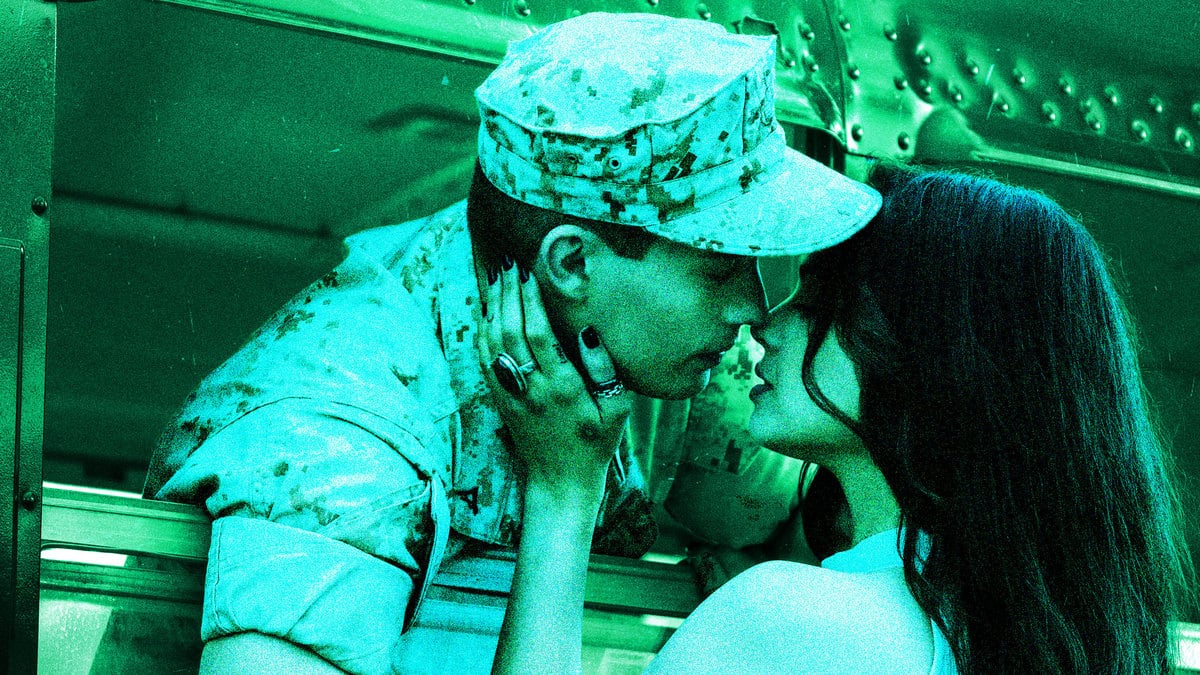A controversy is brewing over in Netflix’s romance department—and no, it’s not about the third installment to Netflix’s rape-y 365 Days saga. The platform is facing harsh (and totally justified) criticism toward its off-the-rails military propaganda movie Purple Hearts. Yes, folks, we’re looking at the Razzie Awards’ first entry for Worst Picture of 2022.
What happens when a girl “blue heart” and a boy “red heart” love each other very much? They create a “purple heart.” That’s the Birds and the Bees 101, guys. This “purple heart” BS is the entire basis of Purple Hearts, which finds one Democrat woman falling in love with a Republican soldier.
Set aside the ghastly title for a minute to learn about the rest of the gut-wrenching (as in, you’ll cry out of boredom, not actual emotions) plot. Aspiring musician Cassie (Sofia Carson) can’t scrounge up enough money to pay her rent and her insulin bills; she’s recently been diagnosed with type-1 diabetes. Nearly on her deathbed, Cassie drums up a decent plan: She’ll marry her best friend in the military for his health insurance.
Snap: He’s in a relationship and refuses her hand. (Side note: If I had the health insurance to save my dying best friend, I’m confident my significant other would understand the circumstances for the time being.) Instead, she’ll marry lib-owning Luke (Nicholas Galitzine), who needs the spouse bonus to pay off his greedy ex-drug dealer “Johnno.” Yes, his name is Johnno. Yes, it sounds like a riff on The Room’s murderous drug dealer Chris-R.

I was on Cassie’s side. Get your health benefits, girl! Steal them from these deadbeat dudes in your life, who would rather enlist in America’s petrifying defense program than do literally anything else! But here’s where Purple Hearts becomes preposterous. Cassie and Luke fall into an enemies-to-lovers trope based on the fact that they’re politically opposed to one another.
I get the pushback against this trope, I do. Occasionally, iconic enemies-to-friends film You’ve Got Mail faces criticism, due to the fact that charming small bookshop owner Kathleen Kelly (Meg Ryan) falls into the arms of the man (Tom Hanks) who shuts her store down by introducing a big Barnes and Noble-Esque emporium right down the street. How can a woman love a man who ruins her life? But it’s Nora Ephron, so we forgive her. There’s chunky sweaters, “Dreams” by the Cranberries, and actually, Tom Hanks is incredibly charming—it’s all undeniable.
But Luke is not. Swap oversized sweaters with military uniforms and “Dreams” with Cassie’s military-wife anthem “Come Back Home,” and the romance begins to look a little more shifty. If your Republican husband isn’t voting to take away your right to free healthcare, he’s stripping your right to abortion. After that, he’ll be sure to take away your right to contraceptive rights, your ability to divorce him, and then, the kicker, your right to vote.
How romantic!
The press for this movie has been abominable, too. Perhaps this is what convinces weirdos like me to watch the movie, gawking at how terrible it is, so maybe I should applaud the filmmakers instead. But a Netflix-owned Tudum article spoon-fed me Purple Hearts grub in a way that made me want to delete my subscription. “Hey, I just wanted to check in on you after watching Purple Hearts,” the article’s first sentence reads. “How are you doing?”
Badly. I’m doing badly. The point of this article is not to cater toward Purple Hearts viewers like me who watched the film out of spite, though; it’s for military moms who stumbled onto Tudum thinking it was a Netflix-themed New York Times and kept reading. The article ends on a cheeky joke about defrauding the government: “HR, if you are reading this, we are just kidding.” Alright, Netflix. Ha ha. Good one.
The interviews are the kicker here. While Galitzine calls Cassie and Luke’s aisle-crossing relationship a “crazy, idealized fantasy,” Carson opts to explain the Purple Hearts title all over again.
“When I got the script five years ago, the country was already not in a great state politically. We were very divided,” Carson said. “It's about these two people, these two hearts, one red, one blue, who were raised in a divided world, who through the power of love come together to form a purple heart. And it's the message that I think the world needs now more than ever.”
This red heart plus blue heart equals purple heart shtick has become akin to Lady Gaga’s famed “There can be 100 people in a room…” quote. Wherever you look, there’s the goofy Purple Hearts title quote. Anyone involved in the film has cited the supposed power of this shlock at least once amidst the press tour.
While chatting with Variety, the film’s director Elizabeth Allen Rosenbaum dropped the gimmick.
“We very much intentionally created two characters that had been bred to hate each other,” Rosenbaum said. “In order for the red heart and the blue heart to kind of turn purple, you have to have them be kind of extreme. Some of the people that they’re surrounded with are even more flawed than they are.”
She’s referring to Luke’s friend, who, at the beginning of the film, toasts “to life, love, and hunting down some goddamn Arabs, baby.” This quote has been widely circulated, but there are a handful of others—my personal favorite is “What exactly would you like us to do [in Iraq]? Teach them pronouns?”—that are equally abhorrent.
The batty title speaks for itself. There can be 99 blue hearts in a room, but all it takes is one red heart with health insurance to make you toss all of your morals.
Keep obsessing! Follow the Daily Beast’s Obsessed on Facebook, Twitter, Instagram and TikTok.






